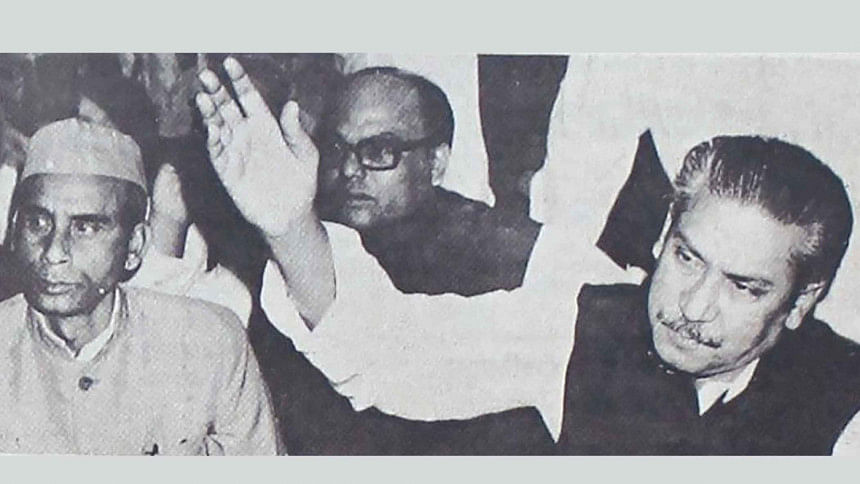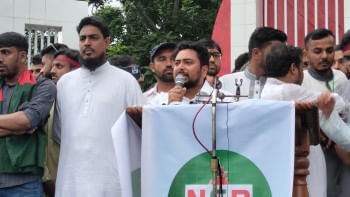Yahya suspends national assembly’s inaugural session

March 1, 1971
President Yahya announced the postponement of the opening of the National Assembly for an indefinite period (1.05 pm). Yahya's voice was absent. Instead, a radio announcer read out the text of the statement ascribed to the President. Two major reasons were cited behind this decision: major party of West Pakistan namely Pakistan People's Party, led by Bhutto, as well as certain other political parties have declared their intention not to attend the National Assembly session on March 3, 1971, and "general situation of tension" created by India.
It may be mentioned here that Bangabandhu Sheikh Mujibur Rahman, chief of the majority party Awami League, had suggested February 15, 1971, for the opening of the National Assembly but the Assembly was called for in the first week of March 1971 following the wishes of the minority party, Bhutto's Pakistan People's Party. Awami League conveyed messages to Yahya through East Pakistan Governor SM Ahsan that postponement of the Assembly would lead to a political explosion in the eastern wing. Ahsan confirmed that he had transmitted the message. [Kamal Hossain, Bangladesh Quest for Freedom and Justice, UPL, 2013, pg. 79]
Yahya Khan was expected to arrive in Dhaka on March 1 to hold a talk with Sheikh Mujib. Kamal Hossain shares that even on the night of February 28, 1971, there were indications that Yahya might still arrive in Dhaka on March 1 and the usual procedures of receiving the president were underway. Referring to a government official who travelled on the plane which was expected to carry the President from Karachi, Kamal Hossain informs that the departure of the plane had been delayed twice in Karachi as Yahya was expected to join the flight.
Yahya decided to stay back.
GW Choudhury provides an interesting background of the event. Yahya asked him to prepare a statement, in a conciliatory vein, on the postponement of the Assembly session. In his draft, it was mentioned that the postponement will not exceed two or three weeks [the radio statement reads: I have, therefore, decided to postpone summoning of National Assembly to later date] Choudhury handed over the draft to Yahya at Islamabad Airport while he was leaving for Karachi. The draft was subsequently given to Lt Gen G.S.M.M Peerzada (PSO of Yahya Khan) who in alliance with Bhutto torpedoed it, adds Choudhury. Bhutto and Peerzada were reported to have drafted the statement. [GW Choudhury, The Last Days of United Pakistan, UPL, 1998, pp. 156-158]
Commenting on the episode, Siddiq Saliq who was then Public Relations Officer in the Pakistan Army at Dhaka writes in his memoir, Witness to Surrender: "When I checked up details of this important development with Major-General 'I' who was on Yahya's personal staff he said, "The President was in Karachi then. We were all downstairs. Major-General 'H' and Major General 'O' were going up and down. They painted such a picture to the President that he had to agree to the draft already prepared." [2017: 44]
When asked about his response Bhutto declined to make any comment. However, his party called off the pre-scheduled general strike.
Pakistan Muslim League Chief Khan Abdul Qayyum called the decision of the President "the only correct decision" and welcomed it. In opposition to this secretary-general, Khan A. Sabur resigned from the party.
DHAKA'S RESPONSE
Upon hearing the news of the suspension of the National Assembly, Dhaka city erupted in anger and hundreds of people rushed from their shops and offices screaming and shouting in a spontaneous display of anger.
The cricket match being held in Dhaka stadium between BCCP (Board of Control for Cricket in Pakistan) and International XI was suspended.
Immediately after the radio broadcast Bangabandhu directed all Awami League Members of Parliament to assemble at Hotel Purbani at 3:00pm. After the parliamentary party meeting, in a crowded press conference, Bangabandhu said, "Only for the sake of a minority party's disagreement the democratic process of constitution-making has been obstructed and the National Assembly session has been postponed sine die. This is most unfortunate as far as we are concerned. We are the representatives of the majority people and we cannot allow it to go unchallenged."
In reply to a question, whether he would proclaim unilateral Independence, Sheikh Mujib said "You Wait". When asked by correspondent whether he was consulted before the postponement of the National Assembly, he said, "No".
Bangabandhu announced a programme for the next 6 days which included observance of a complete strike on March 2 in Dacca and a country-wide strike on March 3 the date earlier fixed for the National Assembly to meet. On March 7, the final programme would be announced in a public meeting at the Race Course Maidan.
Mujib uttered a note of warning: "You will see history made if the conspirators fail to come to their senses."
Thus began the historic non-cooperation movement.
Political leaders, student leaders, and representatives of various professional groups from East Pakistan delivered individual statements expressing their opposition against the suspension of the National Assembly inaugural session.
Later in the evening, Mujib discussed with various political leaders including Ataur Rahman Khan, Mozaffar Ahmed, Maulana Shah Noorani about the changed political situation. Awami League representatives were sent to Santosh to apprise Maulana Bhashani of the situation and to invite him for a meeting with Bangabandhu.
DIPLOMATIC RESPONSE
The US Embassy in Islamabad welcomed Yahya's announcement as possibly providing a "needed cooling-off period". But the US Consulate in Dhaka had a quite different reaction. The then Consul General of Dhaka Archer K Blood sent a telegram to the Embassy ending with the words: "I believe I have just witnessed the beginning of the end of a unified Pakistan." [Archer K Blood, The Cruel Birth of Bangladesh, UPL, 2006, pg. 155]
GOVERNOR AHSAN REMOVED
Later that night, Governor of East Pakistan Admiral Ahsan, who was known as a Bengali sympathizer, was removed by Yahya Khan, and Lt General Shahibzada Yakub Khan took over the charge of the province.
The writer can be contacted at [email protected]

 For all latest news, follow The Daily Star's Google News channel.
For all latest news, follow The Daily Star's Google News channel. 



Comments